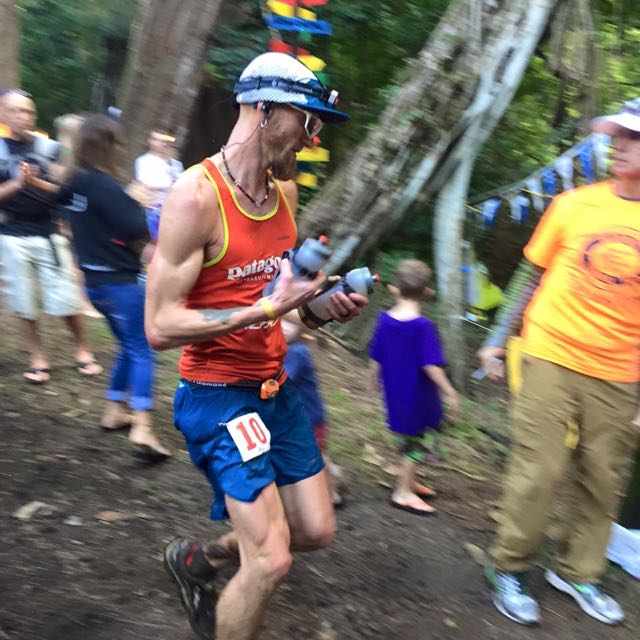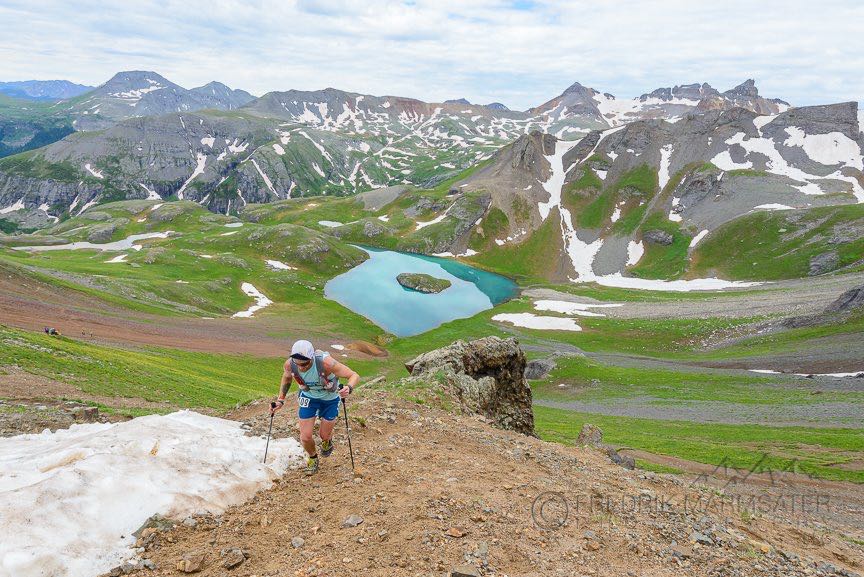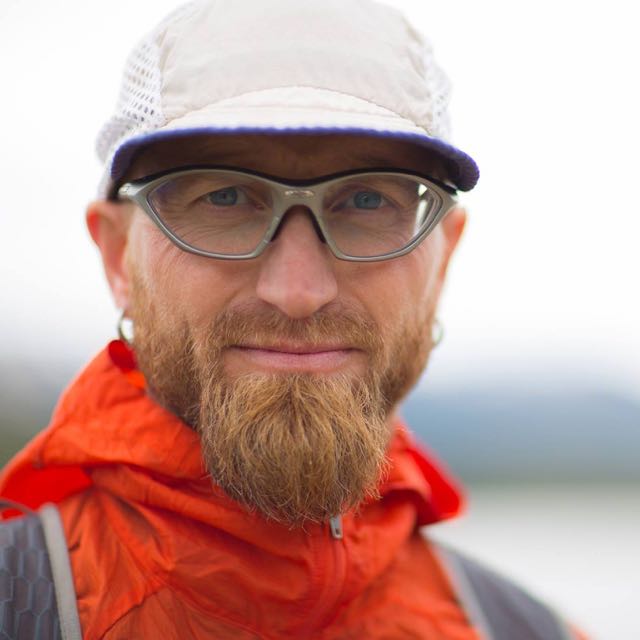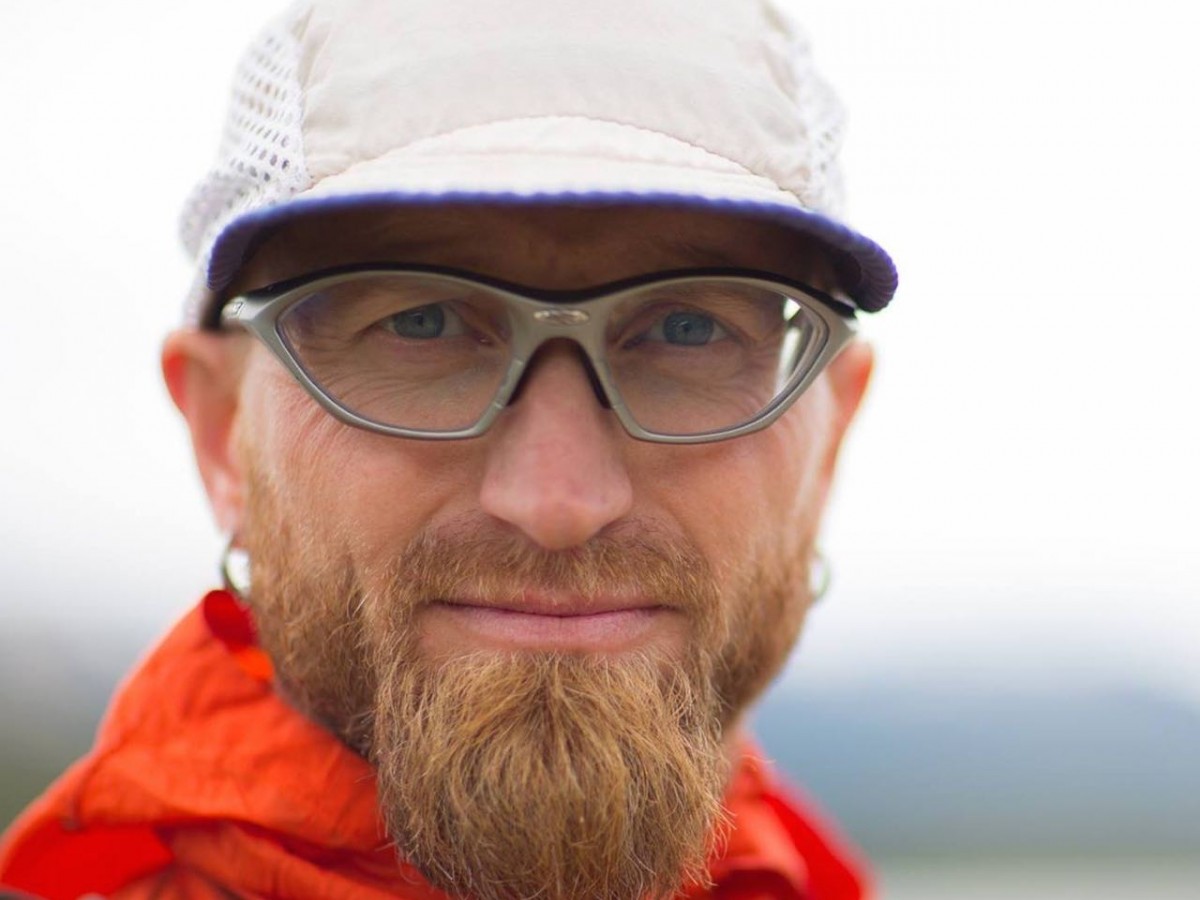BioFlourish Journeys: Ultrarunner Jeff Browning
How He Kicked Candida, Lost Weight, and Won a 100-Mile Race—Eating FAT.
"While racing 100s, I’ve been clawed in the back of the head by a territorial owl, hucked a rock at a moose, chased a skunk, hurdled a marmot, and had a hair-raising face-off with a mountain lion” —Jeff Browning
All these stories are true. But nothing has ever threatened Jeff's performance like the critter that attacked him from within—candida—a simple yeast that can become a colonizing beast under the influence of too much sugar and stress.
"I was itching out of my mind,” recalls Jeff. "Even my insides were itching. Like a creepy crawly feeling that wouldn’t go away. I couldn't sleep. And I only had 7 weeks before my next race to get rid of it."
Having experienced candida overgrowth myself, I can vouch for Jeff's misery. Candida can feel like a cat sharpening its claws inside you—to say nothing of the fog and fatigue that goes with it. I couldn’t imagine running even a mile like that, let alone a hundred miles.
So I caught up with Jeff at Backporch Coffee Roasters to hear more of his story. He arrived early, chatting with folks in the parking lot through rolled-down windows. I watched him for a few moments.
Jeff is slim and tough like a stalk of bamboo. It's hard to believe he comes from a family plagued with obesity, diabetes, heart disease and Alzheimer's. When he speaks, his blue eyes lock forward as if intently searching for something.
"I used to drink 4-5 cups of coffee a day,” he says, sitting down with a cup of joe, nearly white with cream, “I had to. I was just so dependent on carbs and caffeine."
BIOFLOURISH: What changed?
“Well, I became fat-adapted. I opened up my fat-burning pathways. My energy is consistent now. My candida symptoms are gone. I used to consume 400-500 calories of sugar per hour in the form of gel packs and other carbs during races—no wonder I got candida!—but I can train now for three hours without ANY supplemental carbs and I can do a full race with about one fourth the carbs I used to need—because I'm supplying my own calories from onboard fat. That's unheard of. Six months ago I would have just cratered without my carbs. And I can enjoy a cup of coffee now without needing a cup of coffee—without having to go from cup, to cup, to cup, to cup."
Since becoming a fat burner this year, Jeff has been clocking a string of personal bests. In January, he placed 1st in the 2016 HURT 100 (Oahu, Hawaii). And he recently placed 1st in the 2016 Free State 100k, setting a course record. Not too shabby for a 44-year old guy.

Photo by Jiro Ishiduka
So How did you do it, how did you actually become a fat-adapted athlete?
Well, the nutritional path I follow is basically Primal Blueprint Lifestyle & Nutrition by Mark Sisson with a few tweaks for Optimized Fat Metabolism I learned from the guys at Vespa.
So in general, it’s a high fat, low carb, moderate protein lifestyle (LCHF). After experimenting with a bunch of nutritional paths over the past 20 years—Standard American Diet (SAD), Vegetarianism, Whole Foods Balanced Diet, Weston A. Price—it wasn’t till I cut out grains, sugar and legumes that I really noticed a big difference. I recover faster, I have less inflammation, and my energy is even throughout the day. I look at pictures of myself now from last year, and I just looked really puffy and inflamed. So much has changed since then.
But I had to be pushed. And candida was the push. Or shove.
So Let’s talk about that. Why do you think candida waited till 2015 to catch up with you? I mean, you’ve been racing and carb loading for 16 years. You’ve run over 100 ultramarathons! Why now?
2015 was really busy for me. I did a 108 mile race in Patagonia Chile and came back pretty wiped out. That’s when my symptoms started. A few months later I traveled to another 100-miler in France—and I ate a lot of delicious French bread. Had another flare up. Then I did a 100-miler in Japan. Big flare up. Really gnarly one, actually. I had intense itching even inside my stomach and massive fatigue. That’s when I realized it was time to do something different—or game over. That was November. So, December 1st, I went primal. I had 7 weeks before my next race, the HURT 100 in Oahu. So basically I had 7 weeks to fix myself and optimize my fat metabolism.
Sounds like a "Hail Mary” moment.
Yeah, my wife and I tend to jump into things with both feet when it’s show time. I immediately did 20-30 hrs of online research and read several books. Then I launched into Primal Blueprint and LCHF. Turns out, my wife had been just sort of waiting for me to do this. She had wanted to make the switch to Paleo three years ago—because of her own insulin-resistance issues—but I had put my foot down. I remember saying “No I’m an endurance athlete, I gotta have my carbs!” So we just kept eating rice, or sprouted bread, or potatoes every night. Mostly rice and white potatoes.
When I was finally ready, my wife just looked at me and said, "I've had two Paleo cookbooks for three years…"
So your wife is the cook?
Yes, most of the time—I'm running kids to activities most evenings. But with this transition we did team up the first few months until we had new recipes and habits established. We would put on Jazz and cook together. She's on a roll actually, making something new for dinner every week and now we have a bunch of new favorite recipes as weekly staples. Right now we’re working through Against All Grain (a cookbook by Danielle Walker). That’s our favorite, although we don’t do much of the baking recipes—maybe once a week as a treat. Cooking mostly.
And my 13-year old son took a cooking class, so he’s jumping in. He makes guacamole, paleo taco shells, occasional treats like paleo cookies.
That’s awesome your wife was on board—and even a little ahead of you! And then your son! Were there any other people supporting you?
Yes. One of the first things I did was reach out to a couple of mentors with regard to the diet and athletic performance side of things. My friend and teammate Zack Bitter had been doing LCHF for three years. He holds the American record for 100-miles on the track. He really taught me the value of cyclic ketosis—cycling my carbs to help me go in and out of ketosis depending on my training volume and intensity vs. recovery.
Why is that important?
Because you actually need both metabolic pathways open—the glucose pathway AND the fat pathway. It’s just that most of us only need to work on the fat pathway, because that one never gets developed with all the carbs we eat.
I also reached out to Peter Defty of Vespa. And he really helped me refine my approach. Because it takes a minimum of 2 weeks of carb restriction to open up the fat pathways—that’s when you start to come out of the haze. But it takes another 8-12 weeks to become fully fat-adapted and race ready. I didn’t have 8-12 weeks. So with Peter and Zack’s help, I was able to shave it down to 7. They got me going on fat-adaptation AND how to use strategic carbs.
Strategic Carbs?
Yeah, so my maintenance routine has me at about 80 grams of carbs a day. That’s to keep my fat pathways open for when I really need them. But on high training volume days I bump up my carbs to 100 or even 150 grams—some before and some after training—to top off my glycogen and give me that top end pop in workouts. But then I get back into nutritional ketosis as quick as I can, because that’s where the decreased inflammation kicks in. My recovery is off the hook now. I used to have terrible ankle swelling and shin puffiness after every race. I had to wear compression socks and I would limp around for a few days. Now I can see the veins in my ankles the very next day after a race. I don’t have to struggle getting in and out of my car.
Okay, just to be clear, you’re not burning fat all the time?
No. This is normal physiology. Our hunter-herder, hunter-gatherer ancestors cycled in and out of nutritional ketosis. Think about the seasonal availability of carbs back then. And the routine periods of fasting and all the aerobic stuff they did—collecting, hunting, fishing, herding. They always had both pathways open, carbs and fat. They could switch it up, even the skinny ones. Because even the leanest athlete carries enough on-board fat calories to run a 100 miles—if they can access it.
You shouldn’t be in ketosis all the time, unless you have a health issue like a seizure disorder, or something.
So it’s not that you put yourself on a ketogenic diet and now you’re on a ketogenic diet—period. It’s that you’ve become fat-adapted and now you can burn either glucose or onboard fat seamlessly—without crashing, bonking, or needing to subsist on sugar?
Exactly. Keep in mind overall compared to the average American's food intake, I'm still low carb, just not always in ketosis. And my carbs are coming from veggies, fruit and tubers—so natural, primal-like sources.

Photo by Fredrik Marmsater Photography.
You said it takes at least 2 weeks to become somewhat fat-adapted, to “open up” those metabolic pathways. But that can feel like a long time to people and the transition is difficult. How did you handle the side effects—constipation, headaches, low-energy, cramps, electrolyte disturbances?
That’s why I educated myself before I started. We’re not hunter-gatherers anymore. We haven’t been training our metabolisms to be flexible since childhood. Our diets have been overloaded with grains and sugar from day one. So coming straight off that is hard (maybe even dangerous for some people).
For starters you have to increase your salt intake because there’s this temporary phase of salt dumping that happens. When your carb load is high, your kidneys have to hold onto extra sodium to deal with all the glucose you're dumping into your bloodstream. Once you restrict carbs, you dump that extra sodium into your urine. You pee a lot, until you get rid of all that carb puffiness. And you feel like crap if you don’t maintain your sodium, we’re talking like 5 grams of sodium intake a day. (A typical cup of bouillon broth is about 1 gram of sodium). As far as constipation goes, that didn’t really bother me because I kept my sodium up and I was already supplementing magnesium and eating tons of avocados, which contain twice as much potassium as bananas. So my electrolytes were okay. But I did go off caffeine (a diuretic)—and maybe that helped. Low energy? Yeah sure—I just had to ride it out and decrease my training volume and intensity. But when I found my “new clean”, it felt really good.
5 grams of sodium intake a day? That sounds like a lot. Did your blood pressure go up?
No. The opposite. It went down! It always used to run a little high, like 140/90. But now my pressure is usually 120/80 or better. And I used sea salt, not table salt.
So if carb restriction initially causes diuresis, do you think the weight you lost was all water?
No. Not after the first week. I've since lost 8 pounds of FAT—and I've kept it off—around my waist, hips, and butt. I always used to carry a little muffin there, even in peak condition. When you’re an elite runner and you can lose 8 pounds, that’s a huge performance enhancer. Think of carrying 8 fewer pounds over a distance of 100 miles, up and down hills. That adds up. My strength to weight ratio is so much better. I feel 10 years younger. I’m back to the same weight I was at age 19 (137 lbs.). And my waist has gone from 31 inches to 29 inches. I used to say I had a 4-pack, because that’s all the muscle I could see on my stomach. Now my 4-year-old son likes to say, "daddy has a superhero stomach".
What’s an average day of eating look like for you? I realize it changes depending on training volume, but just give us an idea.
Okay. Breakfast is typically two eggs, over easy, with organic coffee with MCT oil and heavy whipping cream (unsweetened). Or sometimes I’ll do a raw egg in raw milk and drink it Rocky style. Then I train at noon (no carbs yet). After training, I’ll have some meat and greens at around 2pm, all smothered in olive oil. Then my wife and I will cook up a nice Paleo dinner together—typically meat, veggies and sometimes sweet potato—especially if I'm in a big training block. Most meals are still mainly meat and veggies cooked or smothered in fat—like butter, coconut oil, or organic lard.
So you drink milk? On Paleo?
Yeah. Raw milk is allowed on Primal Blueprint. If you tolerate milk.
Okay, let’s zoom out for a second. You grew up on a commercial farm in the midwest. How did that influence your philosophy of health and the good life?
Well, it taught me the value of hard work, that’s for sure—row cropping, bucking bales, sloping hogs. It also taught me I didn’t want to be a farmer—or at least not that kind of farmer—working 18 hours a day just to juggle debt.
It also taught me how dirty commercial farming is, how polluting it is, how thin the margins are. All the pesticides, antibiotics, and crowding it takes to make ends meet—it takes a toll on the people and the land. Everything is sprayed. Everything. I recently had my parent’s water tested. It was just full of pesticides. They have to drink bottled water. Nobody in America should have to drink bottled water. My parents are really sick now.
So as a kid, I came away from that with two commitments: #1 to go to college, #2 to always source my food from small, sustainable organic farms. If you're buying your meat and corn and soy from Albertson’s or Safeway or places like that, well…people gotta see that they are voting for a certain kind of world with their dollars. Cheap food is not cheap. That’s what I learned.
You said your parents are sick now. What’s the most important thing you learned from them when they were well?
Well, I got a really big love of sports from my dad. He was a big sports person. He was assistant coach on just about every team I joined until high school. So we had a pretty tight relationship with regard to sports.
My mom really drove me towards academics and art. She was a big influence in me becoming a graphic designer. In fact, she used to assign me art projects like it was homeschool—except it wasn't homeschool. It was just my mom.
But I learned something else from my dad too…I guess you could call it rebellion. Because my dad was always overweight. He used to tell me I’d be fat too, because "that’s just what happens when you get older". We used to argue about it. I never believed him. Or maybe I set out to prove him wrong.
When you have a parent that’s sick and overweight, you can’t help wondering who they would be if they were well. What kind of energy they would have. How independent they would be. My dad has diabetes now. He’s on insulin. He’s had a stroke. He’s too heavy to lift himself with his good arm. I keep thinking what if…
What's your all-time favorite story?
The Prodigal Son. The biblical story. Because I love the idea of second chances. I love the idea that it’s never too late. That we don’t need to beat ourselves up for bad decisions, that we can just move forward.
So what's been the biggest obstacle in your journey over the last 6 months? And how have you overcome it?
The hardest thing has been cooking. Finding new recipes. That’s why we decided to just pick a cookbook and work through it. We really like Against All Grain. The recipes are easy, the pictures are great.
When you're making a big switch like this you’ve got to find new favorites, new comfort foods to replace the old ones, otherwise you just keep going back to your old favorites, back to the way you're used to eating. You've got to explore to find new favorites. Then you find something that is so good, you’re like, wow! this has got to be a staple, we’re going to make this every week. When we first started cooking Paleo recipes, we kept saying "Wow, that was SO good!" every night because cooking with fat is where the taste is and it's so satiating. You push away from the table without overeating—content.
Looking back, what advice would you give to your 25-year old self.
Eat primal! And don’t quit strength training. I mean functional strength training, you know, like working 3 planes of motion and balance. So you can lift furniture, work on ladders, get things out of the cupboard, take out the trash when you’re older. I’m looking at my parents and they can’t do any of these things. If my dad had had a baseline of strength before he had his stroke, he could be a lot more mobile—he can barely pull himself up, he's 5’,8" and weighs 220 lbs.
What's the most important question you're working on right now?
What if it’s not too late to turn my parents health around!? (No hesitation here).
Like what if we could get my dad’s blood sugar under control with a low-glycemic diet? What if we could get 40 pounds off him—that’s like a sack of dog food he’s carrying around. He might actually be able to move. What if we could get him off his insulin. What if my mom came out of her brain fog; what if her memory improved. Like is any of this possible? None of the doctors think so. Their approach is to just keep adding medications, just keep increasing the dose. It’s like they have no more questions.
I just got back from visiting my parents in the midwest. I cleaned their house, I cooked for them, I made shopping lists. While I was there my dad’s blood sugar never went over 107 mg/dl. It’s usually 170-200 every day, he also lost 5 pounds in a week and this week he had to back off 10 units of insulin because he's been sticking to Primal Blueprint diet since I left and the diet is keeping his blood sugar level.
So I have questions...
What books have you given away the most recently, or recommended the most?
Number one would be Primal Blueprint by Mark Sisson. It's so much more than a diet; it’s an entire lifestyle that includes sunshine, sleep, functional strength, aerobic fitness...
Next would be Big Fat Surprise by Nina Teicholz.
And for a geeky read, I would recommend The Art and Science of Low-Carbohydrate Living by researchers Volek and Phinney.
If you had a billboard, what would it say?
FAT = ENERGY | CARBS = FAT
Your diet is pretty far off the grid compared to the nutritional consensus out there. How do you handle criticism?
I don’t argue anymore. I wouldn’t change a thing about the last 6 months—not even the hard parts. I’m lighter and faster than I’ve been in years. My candida is gone. I feel 10 years younger. I’m winning races and setting records as an elite ultra marathoner—at age 44. I've read 4 books on the subject in the last 5 months and listened to countless hours of podcasts. New data is coming out all the time in support of fat-adaptation, like the FASTER study (Volek, et al, 2015). So if people want to learn something, they can, it’s out there.
I have a calm confidence in the primal lifestyle. Some people are open and some aren't to new ideas. Arguing with people when they want to justify their carb intake is kinda silly. They may have to have a health issue like I did before they have a revelation or dig deeper.
Personally, this has been one of those rare "aha" moments in life. I would never go back to high-carb, even if you promised me I’d be candida free somehow. I feel amazing. It’s been a total game changer.

Photo by James Q. Martin
You can find out more about Jeff Browning on his lively ultrarunning blog at www.gobroncobilly.com.
- twitter: @gobroncobilly
- instagram: @gobroncobilly
- Patagonia Trail Ambassador
- Altra Endurance Team
Medical Monitoring Note:
"All individuals considering a low carbohydrate diet should consult their physician before starting. But unless there are significant abnormalities in cardiac, liver, kidney, or endocrine functions, frequent clinical monitoring may not be necessary as the diet proceeds. Clearly, medications for high blood pressure, fluid retention, glucose control, and dyslipidemia will need to be adjusted (usually this means withdrawn or decreased) as the diet proceeds - often sooner rather than later."
—Jeff Volek, PhD., RD. & Stephen D. Phinney MD., PhD.; The Art and Science of Low Carbohydrate Living.
